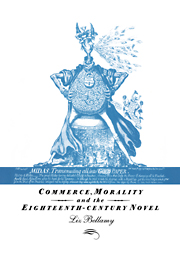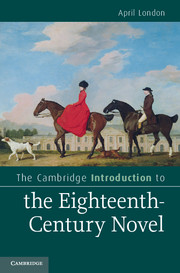Women and Property in the Eighteenth-Century English Novel
This book investigates the critical importance of women to the eighteenth-century debate on property as conducted in the fiction of the period. April London argues that contemporary novels advanced several, often conflicting, interpretations of the relation of women to property, ranging from straightforward assertions of equivalence between women and things to subtle explorations of the self-possession open to those denied a full civic identity. Two contemporary models for the defining of selfhood through reference to property structure the book, one historical (classical republicanism and bourgeois individualism), and the other literary (pastoral and georgic). These paradigms offer a cultural context for the analysis of both canonical and less well-known writers, from Samuel Richardson and Henry Mackenzie to Clara Reeve and Jane West. While this study focuses on fiction from 1740–1800, it also draws on the historiography, literary criticism and philosophy of the period, and on recent feminist and cultural studies.
- Wide-ranging interdisciplinary study placing eighteenth-century novels in the context of early modern explorations of identity
- Explores the work of canonical and non-canonical writers
- Provides insights into gender issues in eighteenth-century fiction and culture
Reviews & endorsements
"With a firm understanding of the historiography, literary criticism, and philosophy of England from 1740-1800, London claims that the relationship of women to property is more complex than has been previously identified and proceeds to prove it through an examination conducted across the competing axes of genre, political theory, social aesthetic, and economic history. Her thorough and detailed readings of her diverse texts provide an illuminating and engaging view of the social climates, literary arenas, and historical moments she has skillfully interwoven." British and American Literatures
"IWomen and Property not only provides fresh perspectives on novels which have enjoyed extensive critical attention, but it also awakens interest in non-canonical, neglected novels." The East-Central Intelligence
"This absorbing and at times provocative study is valuable in itself and indicates significant new directions for future work....this is a serious and reflective contribution to eighteenth-century studies, written in an engaging and unpretentious way. Women and Property is a book any student of the eighteenth-century novel will read with profit." Eighteenth-Century Fiction
"London's book is ot be admired for hte range of texts treated, the rigor of her analyses of women's realtion to property, self-possession, and to community, and her close readings of plots..." Albion
Product details
June 1999Hardback
9780521650137
276 pages
236 × 160 × 22 mm
0.5kg
Available
Table of Contents
- Acknowledgements
- Introduction
- Part I. Samuel Richardson and Georgic: Introduction
- 1. Clarissa and the georgic mode
- 2. Making meaning as constructive labor
- 3. Wicked confederacies
- 4. 'The work of bodies': reading, writing and documents
- Part II. Pastoral: Introduction
- 5. The Man of Feeling
- 6. Colonial narratives: Charles Wentworth and The Female American
- Part III. Community and Confederacy: Introduction
- 7. Versions of community: William Dodd, Sarah Scott, Clara Reeve
- 8. Confederacies of women: Phebe Gibbes and John Trusler
- Part IV. The Politics of Reading: Introduction
- 9. The discourse of manliness: Samuel Jackson Pratt and Robert Bage
- 10. The gendering of radical representation
- 11. History, romance, and the anti-Jacobins' 'common sense'
- 12. Jane West and the politics of reading
- Epilogue
- Notes
- Bibliography
- Index.




